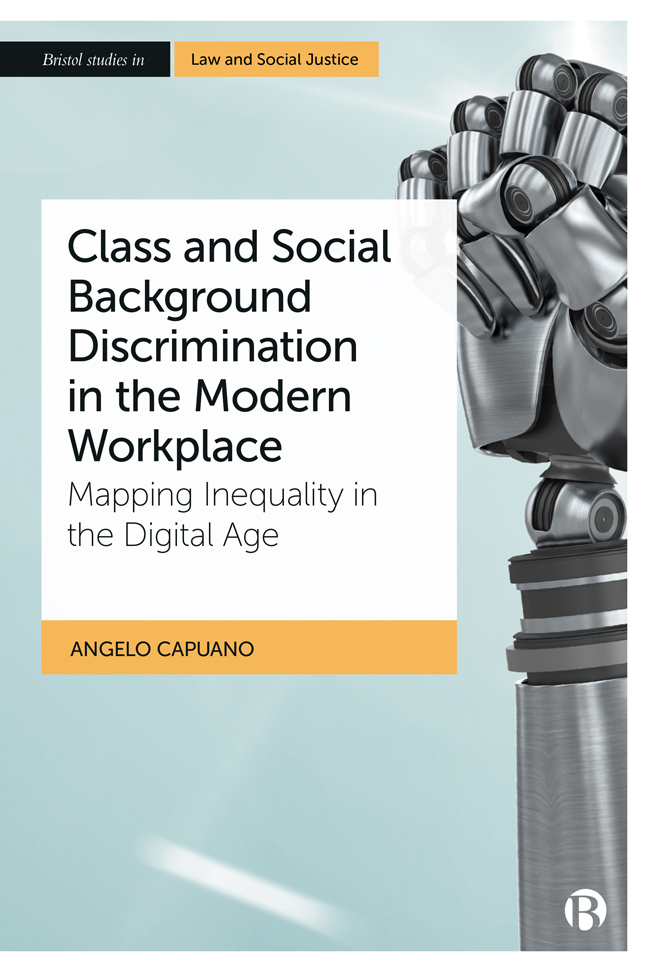 Class and Social Background Discrimination in the Modern Workplace
Class and Social Background Discrimination in the Modern Workplace Book contents
- Frontmatter
- Dedication
- Contents
- Detailed Contents
- Series Editor Preface
- About the Author
- Acknowledgements
- 1 Class and Social Background Discrimination: An Introduction
- 2 Unravelling the Meaning of ‘Social Origin’ Discrimination in Conventions of the International Labour Organization (ILO) and its Applications in the Digital Age
- 3 Mapping the Legal Landscape in Australia, South Africa, Canada and New Zealand and its Applications in the Digital Age
- 4 Social Media in Recruitment, Hiring and Firing Decisions
- 5 Automated Candidate Screening, Algorithms and Artificial Intelligence in Recruitment
- 6 Platform Work and the Post-Pandemic Shift to Remote Work
- 7 Making Future Workplaces Fairer and More Equitable
- References
- Index
2 - Unravelling the Meaning of ‘Social Origin’ Discrimination in Conventions of the International Labour Organization (ILO) and its Applications in the Digital Age
Published online by Cambridge University Press: 23 January 2024
- Frontmatter
- Dedication
- Contents
- Detailed Contents
- Series Editor Preface
- About the Author
- Acknowledgements
- 1 Class and Social Background Discrimination: An Introduction
- 2 Unravelling the Meaning of ‘Social Origin’ Discrimination in Conventions of the International Labour Organization (ILO) and its Applications in the Digital Age
- 3 Mapping the Legal Landscape in Australia, South Africa, Canada and New Zealand and its Applications in the Digital Age
- 4 Social Media in Recruitment, Hiring and Firing Decisions
- 5 Automated Candidate Screening, Algorithms and Artificial Intelligence in Recruitment
- 6 Platform Work and the Post-Pandemic Shift to Remote Work
- 7 Making Future Workplaces Fairer and More Equitable
- References
- Index
Summary
Introduction
As noted in Chapter 1, discrimination on the basis of ‘social origin’ is prohibited by ILO conventions. Article 1 of ILO 111 prohibits discrimination on the basis of grounds including ‘social origin’ and article 5 of ILO 158 prohibits termination of employment on the basis of grounds including ‘social origin’. The term ‘social origin’ is not, however, defined in these instruments.
In 1957 and 1958, when delegates from different countries were debating the meaning of the term ‘social origin’ in the proposed ILO 111, there was much uncertainty from various delegates as to what the term meant or how it would apply in certain countries, such as Canada and Sweden. Approximately 55 years later, when Australian politicians and others turned their attention to the concept of ‘social origin’ discrimination at public hearings into the proposed Human Rights and Anti-Discrimination Bill 2012 (Cth), very little progress had been made in understanding the concept of ‘social origin’ (and ‘social origin’ discrimination). Some Australian senators believed that ‘social origin’ has an ‘almost limitless meaning’, is ‘vague’ and ‘almost meaningless’.
This chapter sets out to achieve two main objectives. First, it clarifies the meaning of ‘social origin’ in ILO conventions to show that, far from being vague or meaningless, the term has a clear meaning in ‘jurisprudence’ developed by the ILO's supervisory bodies. Second, it explains why ILO jurisprudence matters in domestic contexts, particularly Australia and South Africa.
Part I will explain the ILO supervisory system and the respective roles of two supervisory bodies, the ILO Committee of Experts on the Application of Conventions and Recommendations (‘Committee of Experts’) and Commissions of Inquiry, in interpreting ILO conventions. Part II will explain the concept and scope of ‘discrimination’ in ILO jurisprudence, to set the stage for an analysis of discrimination based on ‘social origin’. Part III will then analyse the reports of ILO supervisory bodies and the travaux préparatoires (preparatory works) of relevant treaty to elucidate the meaning of ‘social origin’ in ILO conventions, and clarify how this type of discrimination might occur. Finally, Part IV will rely on legal rules of interpretation to explain why this ILO jurisprudence matters in domestic contexts, particularly in Australia and South Africa.
I. The ILO and ILO supervisory bodies
One function of the ILO is to supervise the implementation of ILO conventions and recommendations in member states.
- Type
- Chapter
- Information
- Class and Social Background Discrimination in the Modern WorkplaceMapping Inequality in the Digital Age, pp. 33 - 64Publisher: Bristol University PressPrint publication year: 2023


